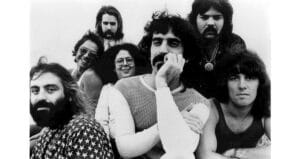1. Who is Genesis? The Pioneers of Progressive Rock
Genesis is a British progressive rock band formed in 1967 in Godalming, Surrey. Originally known for their complex musical structures, conceptual albums, and theatrical live performances, Genesis became one of the most successful and influential rock bands in history. The band’s sound evolved over the decades, transitioning from progressive rock to a more pop-oriented sound, yet maintaining its unique approach to music and storytelling.
Genesis was known for its innovative use of synthesizers, melodic themes, and dynamic changes in style, with albums that explored complex themes, mythology, and personal narratives.
2. Key Milestones in Genesis’ Career
- 1967 – Formation and Early Years:
Genesis was formed by Tony Banks (keyboardist), Mike Rutherford (bassist/guitarist), Peter Gabriel (vocals), Anthony Phillips (guitar), and Chris Stewart (drums). Initially, their music was influenced by psychedelic rock and early progressive rock elements, and they quickly gained attention in the British underground music scene. - 1970 – Trespass (Debut Album):
Their first album, Trespass (1970), marked the beginning of their transformation into a progressive rock band. While still drawing on psychedelic rock, the album’s long, intricate tracks pointed to the band’s growing interest in musical complexity and storytelling.- Key Tracks: “The Knife,” “Looking for Someone.”
- 1971-1975 – The Classic Lineup and Key Albums:
The band reached its most influential lineup with Peter Gabriel (vocals), Tony Banks (keyboards), Mike Rutherford (bass, guitar), Phil Collins (drums), and Steve Hackett (guitar).- 1972 – Foxtrot (Breakthrough):
This album marked Genesis’ arrival as a major force in progressive rock, combining theatricality and musical complexity. The epic track “Supper’s Ready” became a defining moment in their career.- Key Tracks: “Watcher of the Skies,” “Supper’s Ready.”
- 1973 – Selling England by the Pound (Critical and Commercial Success):
Often cited as one of their best works, Selling England by the Pound showcased the band’s elaborate arrangements, poetic lyrics, and cultural commentary.- Key Tracks: “Dancing with the Moonlit Knight,” “Firth of Fifth.”
- 1974 – The Lamb Lies Down on Broadway (Conceptual Masterpiece):
A double album with a conceptual narrative, The Lamb remains one of Genesis’ most ambitious works, though it marked the departure of Peter Gabriel after its completion.- Key Tracks: “The Lamb Lies Down on Broadway,” “In the Cage.”
- 1972 – Foxtrot (Breakthrough):
- 1975 – Peter Gabriel Leaves, Phil Collins Takes Over:
After Peter Gabriel’s departure, Phil Collins became the lead singer, and the band began to evolve in a more accessible direction, but still maintaining the essence of their progressive rock roots.- 1976 – A Trick of the Tail (New Beginning):
The first album with Phil Collins as the lead vocalist was a major success, maintaining much of their progressive rock complexity while introducing more melodic elements.- Key Tracks: “Squonk,” “A Trick of the Tail.”
- 1977 – Wind & Wuthering (Evolution of Sound):
With the departure of Steve Hackett after this album, Genesis’ sound continued to evolve, now leaning more toward melodic rock with progressive undertones.- Key Tracks: “Eleventh Earl of Mar,” “One for the Vine.”
- 1976 – A Trick of the Tail (New Beginning):
- 1978-1986 – The Pop Era:
Genesis gradually embraced more pop-oriented and radio-friendly sounds. Their albums in the late 1970s and early 1980s reflect this change, with songs more geared towards mainstream success.- 1980 – Duke (Pop Rock Success):
Duke introduced more synthesizers and catchy hooks, leading to hits like “Turn It On Again.”- Key Tracks: “Turn It On Again,” “Duchess.”
- 1983 – Genesis (Mainstream Success):
The self-titled album is one of their most successful albums, showcasing a much more pop-rock approach, with Phil Collins’ prominent vocals.- Key Tracks: “That’s All,” “Mama.”
- 1986 – Invisible Touch (Global Breakthrough):
Invisible Touch was Genesis’ most commercially successful album, with five singles reaching the Top 10 on the charts.- Key Tracks: “Invisible Touch,” “Land of Confusion.”
- 1980 – Duke (Pop Rock Success):
- 1990s and 2000s – Changes and Hiatuses:
Throughout the 1990s, Genesis underwent several lineup changes, with Phil Collins and Tony Banks as the mainstays of the band.- 1991 – We Can’t Dance (Final Genesis Album with Phil Collins):
The band’s last studio album with Phil Collins as lead vocalist marked a shift towards a more pop rock and commercial sound.- Key Tracks: “No Son of Mine,” “I Can’t Dance.”
- 1996 – Calling All Stations (New Direction):
After Phil Collins left, Ray Wilson became the new vocalist. The album was a departure from their earlier sound, blending alternative rock with Genesis’ classic style.- Key Tracks: “Congo,” “Not About Us.”
- 1991 – We Can’t Dance (Final Genesis Album with Phil Collins):
- Reunion and Touring in the 2000s:
Genesis reunited in 2007 for the Turn It On Again tour, with Phil Collins, Tony Banks, and Mike Rutherford performing together once again. The tour was a massive success, though no new studio albums were released.
3. The Members of Genesis
Core Members
- Tony Banks (Keyboards, Vocals) – A founding member and the band’s primary composer and keyboardist. His distinctive playing is central to Genesis’ sound, providing both melodic and atmospheric elements.
- Mike Rutherford (Guitar, Bass) – Another founding member, Mike Rutherford was responsible for both bass guitar and guitar in the band, offering a solid backbone to their sound and contributing to songwriting.
- Phil Collins (Drums, Vocals) – Initially the drummer, Collins became the lead vocalist after Peter Gabriel’s departure, and his emotive voice helped propel Genesis into the mainstream.
- Peter Gabriel (Vocals, Flute) – The original frontman, Gabriel’s theatrical presence, distinctive vocals, and conceptual approach helped define the band’s early progressive sound.
- Steve Hackett (Guitar) – Joined in 1971, Hackett’s virtuoso guitar playing was central to Genesis’ progressive rock period, particularly on albums like Foxtrot and The Lamb Lies Down on Broadway.
- Ray Wilson (Vocals) – The last lead vocalist after Phil Collins left, Ray Wilson appeared on the band’s 1997 album, Calling All Stations.
4. Genesis Complete Discography
4.1 Studio Albums
- From Genesis to Revelation (1969)
- Their debut album was more psychedelic than progressive and was initially not very successful.
- Key Tracks: “The Knife.”
- Trespass (1970)
- Their first true progressive rock album, it showcased long compositions and detailed arrangements.
- Key Tracks: “The Knife,” “Looking for Someone.”
- Foxtrot (1972)
- Foxtrot marked the beginning of Genesis’ rise to fame in the progressive rock scene, with tracks like “Supper’s Ready.”
- Key Tracks: “Watcher of the Skies,” “Supper’s Ready.”
- Selling England by the Pound (1973)
- A critical masterpiece, this album features some of the band’s most iconic work, including “Firth of Fifth” and “Dancing with the Moonlit Knight.”
- Key Tracks: “Dancing with the Moonlit Knight,” “Firth of Fifth.”
- The Lamb Lies Down on Broadway (1974)
- A concept double album, it is often regarded as the band’s most ambitious work, even as it marked the end of Peter Gabriel’s tenure.
- Key Tracks: “The Lamb Lies Down on Broadway,” “In the Cage.”
- A Trick of the Tail (1976)
- The first Genesis album with Phil Collins as lead vocalist, it maintained their progressive rock roots while introducing more accessible elements.
- Key Tracks: “Squonk,” “A Trick of the Tail.”
- Wind & Wuthering (1977)
- This album continued the progressive sound but was also the last to feature Steve Hackett.
- Key Tracks: “Eleventh Earl of Mar,” “One for the Vine.”
- Duke (1980)
- This album marked a shift toward more synth-heavy and radio-friendly rock, though still containing progressive elements.
- Key Tracks: “Turn It On Again,” “Duchess.”
- Genesis (1983)
- A pop-rock oriented album with Phil Collins fully embracing his pop success.
- Key Tracks: “That’s All,” “Mama.”
- Invisible Touch (1986)
- Genesis’ most commercially successful album, featuring several hits that catapulted them to international stardom.
- Key Tracks: “Invisible Touch,” “Land of Confusion.”
4.2 Notable Live Albums and Compilations
- Genesis Live (1973)
- The Way We Walk: The Shorts (1992)
5. Fascinating Facts about Genesis
- Peter Gabriel’s Theatrical Performances: Known for his eccentric costumes and performance art, Gabriel’s live shows set a new standard for theatricality in rock concerts.
- Phil Collins’ Dual Role: Collins played both drums and served as the band’s lead vocalist, which contributed to their ability to blend complex rhythms with catchy melodies.
- Genesis’ Influence: The band’s progressive rock sound inspired numerous bands in the genre, including Yes, Emerson, Lake & Palmer, and Marillion.
- Multiple Lineups: Genesis’ ability to adapt to changing musical tastes, such as transitioning from progressive rock to pop rock, helped them maintain a long-lasting career.




